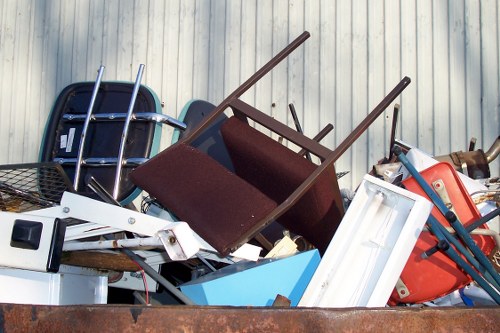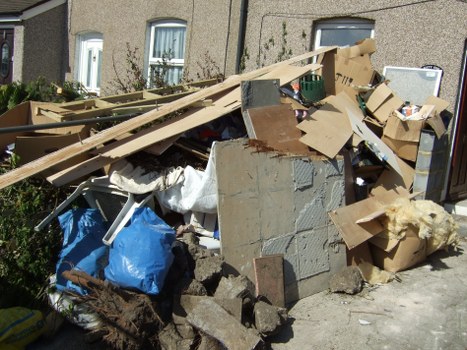Effective Construction Waste Disposal in Barking

Introduction to Construction Waste Disposal
Construction activities generate a significant amount of waste, which, if not managed properly, can lead to environmental degradation and health hazards. In Barking, a bustling area with numerous construction projects, effective waste disposal is essential to maintain cleanliness and sustainability.
Proper disposal of construction waste not only ensures compliance with local regulations but also promotes recycling and reuse of materials, reducing the overall environmental footprint.
Understanding the best practices for construction waste management can help contractors, builders, and homeowners in Barking streamline their projects while minimizing waste.

Local Regulations and Compliance
Understanding Barking's Waste Disposal Laws
Barking, being part of the London Borough, adheres to strict waste management regulations aimed at reducing landfill use and promoting recycling. Compliance with these laws is mandatory for all construction-related activities.
Key Regulations to Follow
- Waste Hierarchy Compliance: Prioritize reduction, reuse, and recycling over disposal.
- Permits and Licensing: Obtain necessary permits for waste transportation and disposal.
- Documentation: Maintain accurate records of waste types and quantities.
Adhering to these regulations not only avoids legal penalties but also contributes to a greener community.

Types of Construction Waste
Common Waste Materials
Construction projects in Barking produce various types of waste, each requiring specific disposal methods. Understanding these can streamline the waste management process.
Categories of Waste
- Structural Waste: Concrete, bricks, and metals.
- Finishing Materials: Paints, adhesives, and tiles.
- Packaging: Cardboard, plastics, and wood.
- Hazardous Waste: Asbestos, solvents, and batteries.
Proper segregation of these materials at the source can significantly enhance the efficiency of the disposal process.

Methods of Waste Disposal
Recycling and Reuse
Recycling is a cornerstone of sustainable waste management. In Barking, several facilities cater to the recycling of construction materials, ensuring that valuable resources are recovered and repurposed.
Recycling Processes
- Metal Recycling: Salvaging steel and aluminum for reuse.
- Concrete Recycling: Crushing old concrete for use as aggregate.
- Wood Recycling: Repurposing timber for new construction projects.
Implementing these recycling methods reduces the demand for raw materials and minimizes landfill usage.

Landfilling and Its Implications
Environment Impact
While landfilling is a common method for disposing of construction waste, it has significant environmental implications. In Barking, responsible landfilling practices are enforced to mitigate negative effects.
Sustainable Landfilling Practices
- Controlled Leachate Management: Preventing contamination of groundwater.
- Gas Emission Controls: Capturing methane emissions to reduce greenhouse gases.
- Post-Closure Monitoring: Ensuring long-term environmental protection.
Reducing reliance on landfilling through alternative methods is crucial for environmental sustainability.

Recycling Facilities in Barking
Local Recycling Centers
Barking boasts several state-of-the-art recycling centers equipped to handle diverse construction waste materials. These centers play a pivotal role in the community's waste management strategy.
Notable Recycling Centers
- Barking Recycling Hub: Specializes in metal and concrete recycling.
- The Green Depot: Focuses on wood and plastic materials.
- EcoWaste Barking: Handles hazardous and non-hazardous waste alike.
Collaborating with these facilities can enhance the efficiency of waste disposal for construction projects.

Innovative Waste Management Solutions
Advanced Technologies
Innovative technologies are transforming construction waste disposal in Barking, making the process more efficient and environmentally friendly.
Cutting-Edge Methods
- Automated Sorting Systems: Enhance the accuracy of waste segregation.
- 3D Recycling: Converting waste materials into new construction products.
- Smart Waste Tracking: Utilizing IoT for real-time monitoring of waste disposal.
Adopting these technologies can lead to significant improvements in waste management practices.

Benefits of Proper Waste Disposal
Environmental and Economic Advantages
Effective construction waste disposal offers numerous benefits, both environmentally and economically. In Barking, these advantages are increasingly recognized and leveraged.
Key Benefits
- Environmental Preservation: Reduces pollution and conserves natural resources.
- Cost Savings: Lower disposal fees through recycling and efficient waste management.
- Regulatory Compliance: Avoid fines and enhance reputation by adhering to laws.
- Community Health: Minimizes health risks associated with improper waste management.
These benefits highlight the importance of integrating effective waste disposal strategies into construction projects.

Challenges in Waste Disposal
Common Obstacles
Despite the benefits, construction waste disposal in Barking faces several challenges that can impede effective management.
Major Challenges
- Space Limitations: Limited availability of recycling facilities.
- Cost Constraints: High expenses associated with advanced disposal methods.
- Awareness and Training: Lack of knowledge among workers regarding best practices.
- Regulatory Changes: Keeping up with evolving waste management laws.
Addressing these challenges requires collaborative efforts between local authorities, businesses, and the community.

Strategies for Effective Waste Management
Best Practices
Implementing strategic approaches can significantly improve construction waste disposal in Barking, ensuring both efficiency and compliance.
Recommended Strategies
- Waste Audits: Regular assessments to identify and reduce waste sources.
- Employee Training: Educating workers on proper waste segregation and disposal methods.
- Partnerships with Recycling Firms: Collaborating with local facilities for streamlined disposal.
- Adopting Circular Economy Principles: Designing projects that prioritize reuse and recycling.
These strategies foster a proactive approach to waste management, leading to sustainable construction practices.

Choosing a Waste Disposal Service
Factors to Consider
Selecting the right waste disposal service is crucial for the success of construction projects in Barking. Several factors should be evaluated to ensure optimal service.
Key Considerations
- Reputation and Reliability: Ensure the service provider has a proven track record.
- Range of Services: Comprehensive services including collection, recycling, and disposal.
- Compliance with Regulations: Adherence to local waste management laws.
- Cost-Effectiveness: Competitive pricing without compromising quality.
- Customer Support: Accessible support for handling inquiries and issues.
Thoroughly evaluating these factors can lead to the selection of a service that aligns with project needs and sustainability goals.

Innovations in Waste Reduction
Technological Advancements
Technological innovations are playing a significant role in reducing construction waste in Barking. These advancements offer new ways to manage and minimize waste effectively.
Notable Innovations
- Building Information Modeling (BIM): Enhances project planning to reduce material waste.
- Prefabrication Techniques: Minimizes on-site waste through off-site construction.
- Advanced Recycling Equipment: Improves the efficiency of material recovery.
Embracing these innovations can lead to more sustainable construction practices and significant waste reduction.

Community Involvement
Engaging the Local Community
Active participation of the Barking community is essential for the success of construction waste disposal initiatives. Engaging residents and local businesses fosters a collective effort towards sustainability.
Ways to Involve the Community
- Educational Programs: Informing the public about the importance of waste management.
- Recycling Drives: Organizing events to collect recyclable materials.
- Collaborative Projects: Partnering with local organizations for waste reduction projects.
- Incentive Programs: Providing rewards for effective waste segregation and recycling.
Community involvement not only enhances waste management efforts but also builds a culture of sustainability.

Future of Construction Waste Disposal in Barking
Trends and Predictions
The future of construction waste disposal in Barking is poised for significant advancements, driven by technology, policy changes, and increasing environmental awareness.
Emerging Trends
- Increased Automation: More automated systems for waste sorting and recycling.
- Green Building Certifications: Enhanced standards promoting sustainable waste management.
- Circular Economy Models: Emphasizing the reuse and recycling of materials in construction.
- Smart Waste Solutions: Utilizing AI and IoT for efficient waste management.
These trends indicate a move towards more efficient, sustainable, and technologically advanced waste disposal practices.

Conclusion
Taking Action for a Sustainable Future
Effective construction waste disposal is vital for the sustainability and cleanliness of Barking. By adhering to local regulations, leveraging recycling facilities, embracing innovative solutions, and involving the community, significant strides can be made in waste management.
Final Thoughts
Implementing these practices not only benefits the environment but also enhances the efficiency and reputation of construction projects. Embracing responsible waste disposal is a step towards a greener and more sustainable future for Barking.
Contact us today to learn more about our construction waste disposal services and how we can help your project in Barking achieve its sustainability goals.